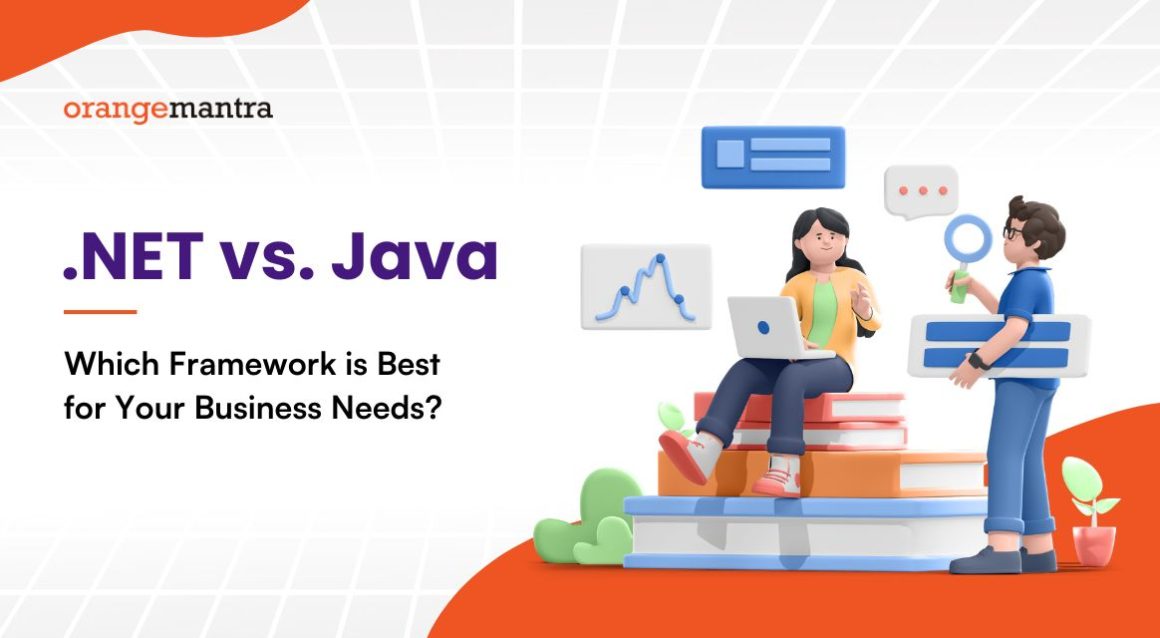You might be looking for a clear answer in the .NET vs Java debate, but it’s not possible. And if someone is telling you that one is better than the other, they either lack knowledge or they are deliberately hiding it.
As a renowned .NET and Java development company having delivered hundreds of projects, this is our answer – the choice depends on your business’s unique needs and priorities. We know this is not what you might be looking for, but this is the hard truth.
They both are robust, secure, and scalable as a business generally needs. However, they also possess some unique capabilities and incapabilities that are best for unique business scenarios.
So, a better question will be this.:
.NET vs Java: How Should I Choose Between Them?
Now you are talking. See, your choice will depend largely on the following factor:
- Team Expertise
First and foremost, comes the capabilities of your team. If your team is proficient in C# or other languages relevant to .NET, then obviously your choice will be a natural choice.
On the other hand, if Java is your team’s expertise, then move forward with it.
- Existing Infrastructure
If you have already invested in the Microsoft ecosystem, .NET is an easy choice as it can integrate easily with your existing tools and services.
However, if you have a heterogeneous environment, Java’s platform independence is an advantage.
- Project Requirements
Contrary to what many would believe, .NET offers better cross-platform capabilities. So, if you need to target multiple platforms, .NET is the way to go. However, both platforms can deliver good performance for most enterprise applications.
On the other hand, for specific frameworks or libraries you need to check the platform individually.
- Development Model:
For a more structured and managed development environment, you can integrate .NET with Visual Studio. But if you prefer flexibility with a more open-source approach, choose Java.
- Long-Term Goals:
NET can prove to be a strategic choice if you are thinking long term, given its association with Microsoft.
However, if you want to avoid vendor lock-in, Java is the way to go.
- Unique Edge from Business Perspective
On the same lines, .NET’s integration with Microsoft’s technologies, such as Azure, is advantageous for businesses heavily invested in the Microsoft ecosystem.
While Java’s extensive ecosystem and a large community of developers is its unique strong point. It offers your developers a wealth of resources and support to fuel rapid development and maintain complex applications.
Now if you want to dig deep into the topic, we have discussed both these technologies in detail. Covering them right from the time of their inception to their evaluation on the basis of security, compatibility and scalability. However, for a very specific discussion you are welcome to reach out to us. We are a renowned software solution development company offering services in .NET and Java.
What is Java – A Coffee
Developed by James Gosling and team at Sun Microsystems in 1995, Java is certainly one of the most popular programing languages. Interestingly, it is named after the Java coffee that comes from Indonesian island of the same name.
While the name was primarily chosen for its connotation of energy and vitality, it is also quite reflective of the capabilities of Java. Just as coffee is almost for everyone, the open-source language is also accessible and versatile for serving various industries and businesses.
Java Virtual Machine (JVM) – The Phantom Benefactor
But before moving deeper into these capabilities it is critical to understand JVM which plays a crucial role in Java’s platform independence.
JVM is the unsung hero behind Java’s strong capabilities. It is basically an intermediary software platform between Java program and the hardware. Java code can run on any device or operating system without modification, as long as the device has a JVM installed.
What it does is translate Java code into machine code so that the underlying system can execute regardless of the computing architecture.
Along with JVM, the rich libraries and frameworks make up the extensive ecosystem of tools for web development, mobile development, desktop applications, and more.
And lastly, Java’s memory management and multithreading capabilities lead to efficient and high-performance applications.
Java is Compatible and Versatile, Thanks to JVM
For compatibility, Java takes the help of JVM to run its program on any device, achieving the renowned platform independent WORA functionality – “write once, run anywhere”.
This compatibility helps businesses reach more users with a varied range of devices.
Further Java is versatile enough to be used for all kinds of applications and solutions. It can be used for customer-oriented software like social media apps (e.g. Instagram and X) and gaming apps (e.g. Minecraft and World of Warcraft).
Likewise, it can also be used for business-serving solutions like ERPs (for e.g. Oracle E-Business Suite and SAP ERP) and CRM (for e.g. Salesforce and SugarCRM).
These qualities make Java quite suitable for cross-platform development. Notably, Java was the third most popular programming language in 2022 according to Github.
Jave is Packed with Security Features
Yet another critical area where JVM plays a role is security. JVM keeps a check on the bytecode for security violations before execution and stops preventing harmful code from running.
But that’s not it, there are other safeguards as well that Java makes use of.
One of them is security manager. The feature controls access to system resources like files and networks, ensuring restricted operations. Then, second, there is Automatic Memory Management i.e. Java’s garbage collection that works to minimize memory leaks. To explain, a memory leak is when a program fails to release memory even if it is no longer needed. This leads to a gradual loss of available memory over time and attackers have their way of exploiting such scenarios. But as Java tends to reduce such incidence, it achieves better security.
Lastly, the built-in Security APIs. Java makes use of cryptography, authentication, and secure communication tools by providing developers with libraries and frameworks.
Java’s Scalability is Inherent in its Design
As an ideal language for businesses, Java supports scalability of application. For this
First, Java is efficient at handling multiple tasks simultaneously using Multithreading. This improves performance as the load increases. Second, Java is great at integrating distributed systems, thereby helping application scale across multiple services. Third, modular architecture. By design Java allows applications to grow and incorporate changes without major code changes.
Lastly, Java makes use of frameworks like Spring to build scalable applications with minimal effort.
Under our Java development services, we get you a solution that taps into all these amazing java capabilities.
The Emergence of .NET
With the aim to simplify and amplify app development experience and overcome low level concerns, like memory management and security, Microsoft started working on a managed code environment in the 1990s.
As a result, the .NET Framework came into existence in 2002.
It included essential components to manage the execution of applications, and various libraries for building Windows-based applications, web services, and data access.
However, in 2014, Microsoft recognized the limitations of the original framework—particularly its Windows-only nature— and came up with .NET Core. This new version was meant to be cross-platform. Thereby allowing developers to build applications for Windows, Linux, and even macOS.
Over time the .NET platform expanded significantly, so much so that Microsoft felt the need to unify the various platforms under a single umbrella. Hence, came .NET 5.0 in November 2020. The platform supported multiple programming languages and sought to expand further to incorporate development across different environments such as cloud and IoT.
As of late, the latest version is .NET 7.0 that was launched in November 2022. These versions further enhanced cross-platform capabilities and introduced features like MAUI (Multi-platform App UI) to build native applications across devices. And this brings us to the features of .NET.
Compatible But Takes a Different Route
Just as we saw in Java and also mentioned above, .NET allows development for various operating systems. While Windows is a given, the other platforms were Linux and macOS. However, this .NET support to various hardware platforms comes primarily through its cross-platform capability.
Security On Par
.NET also makes use of Automatic Memory Management for garbage collection and automatically frees up memory. We already discussed above that this reduces memory leaks thereby preventing attacks while improving performance with better resource allocation and minimal memory overhead. Hence, the applications face fewer interruptions and run better.
Scalability – Just What is Needed
Again, .NET employs performance-enhancing techniques like multithreading, asynchronous programming, and advanced caching mechanisms.
This leads to efficient management of concurrent tasks and resource utilization. Resulting in expedited execution with better scalability. As now, the applications become capable of handling increased load and more users simultaneously without performance degradation.
Reach out for specialized discussion for your business under our comprehensive .NET development services including consultation.
Conclusion
.NET vs Java, the debate is eternal, and there is no one answer. Both platforms are great in their own way. You need to focus more on your own capabilities as we discussed in the above section before making a choice.
FAQs
What is the main difference between .NET and Java?
.NET is primarily associated with Microsoft, while Java is platform independent. However, any expert in the domain will tell you that both popular programming platforms are great in their own way. Our suggestion is to contact a .NET development company and one that works in Java to get an expert evaluation and a solution that specifically suits you.
Which is better, .NET or Java?
Sorry, but there’s no definitive answer. The best choice depends on factors like your team’s expertise, your project requirements, and the existing infrastructure you have with you. Better connect with a .NET development services provider or a Java development company to better understand the difference.
Is .NET faster than Java?
Although .NET has shown significant advancements over the period, the speed depends on specific use cases. Mind you, both platforms have undergone performance improvements.



